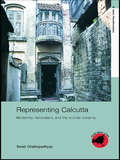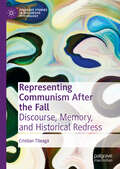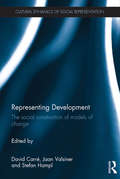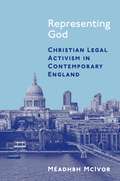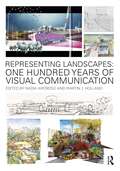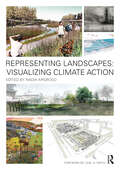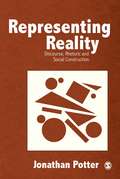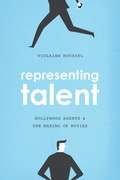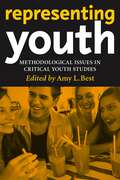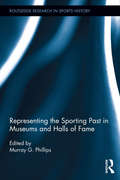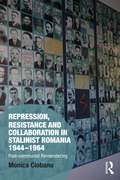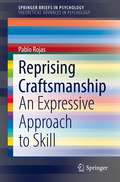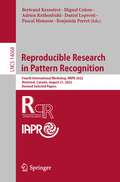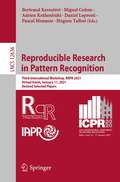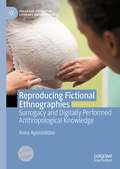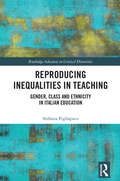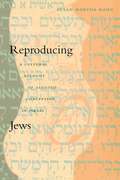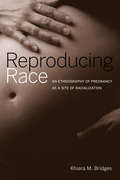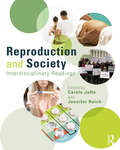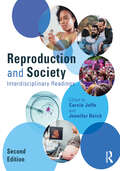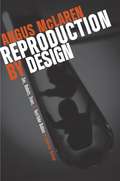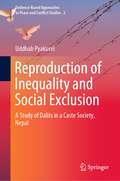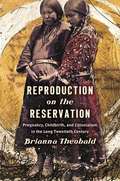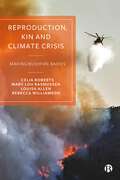- Table View
- List View
Representing Ageing: Images and Identities
by Virpi YlänneThis collection critically examines twenty-first century representations of ageing, focusing on various media images and discourses as well as individuals' own experiences and self-presentations of ageing, drawing on innovative new empirical data.
Representing Calcutta: Modernity, Nationalism and the Colonial Uncanny (Asia's Transformations/Asia's Great Cities #2)
by Swati ChattopadhyayRepresenting Calcutta is a spatial history of the colonial city, and addresses the question of modernity that haunts our perception of Calcutta. The book responds to two inter-related concerns about the city. First is the image of Calcutta as the worst case scenario of a Third World city -- the proverbial 'city of dreadful nights.' Second is the changing nature of the city’s public spaces -- the demise of certain forms of urban sociality that has been mourned in recent literature as the passing of Bengali modernity. By examining architecture, city plans, paintings, literature, and official reports through the lens of postcolonial, feminist, and spatial theory, the book explores the conditions of colonialism and anti-colonial nationalism that produced the city as a modern artefact. At the centre of this exploration resides the problem of 'representing' the city, representation understood as description and narration, as well as political representation. In doing so, Chattopadhyay questions the very idea of colonial cities as creations of the colonizers, and the model of colonial cities as dual cities, split in black and white areas, in favour of a more complicated view of the topography.
Representing Communism After the Fall: Discourse, Memory, and Historical Redress (Palgrave Studies in Discursive Psychology)
by Cristian TileagăThis book explores the contribution of discursive psychology and discourse analysis to researching the relationship between history and collective memory. Analysing significant manifestations of the moral vocabulary of the Romanian transition from communism to democracy, the author demonstrates how discursive psychology can be used to understand some of the enduring and persistent dilemmas around the legacy of communism. This book argues that an understanding of language as an action-oriented, world-building resource can fill an important gap in the theorizing of public controversies over individual and collective meaning of the recent (communist) past. The author posits that discursive social psychology can serve as an intellectual and empirical bridge that can overcome several of the difficulties faced by researchers working in transitional justice studies and cognate fields. This reflective book will appeal to students and scholars of transitional justice, discursive psychology, memory studies, and the sociology of change.
Representing Development: The social construction of models of change (Cultural Dynamics of Social Representation)
by Jaan Valsiner David Marco Carre Stefan HamplRepresenting Development presents the different social representations that have formed the idea of development in Western thinking over the past three centuries. Offering an acute perspective on the current state of developmental science and providing constructive insights into future pathways, the book draws together twelve contributors with a variety of multidisciplinary and international perspectives to focus upon development in fields including biology, psychology and sociology. Chapters and commentaries in this volume present a variety of perspectives surrounding social representation and development, addressing their contemporary enactments and reflecting on future theoretical and empirical directions. The first section of the book provides an historical account of early representations of development that, having come from life science, has shaped the way in which developmental science has approached development. Section two focuses upon the contemporary issues of developmental psychology, neuroscience and developmental science at large. The final section offers a series of commentaries pointing to the questions opened by the previous chapters, looking to outline the future lines of developmental thinking. This book will be of particular interest to child psychologists, educational psychologists and sociologists or historians of science, as well as academics and students interested in developmental and life sciences.
Representing God: Christian Legal Activism in Contemporary England
by Méadhbh McIvorHow evangelical activism in England contributes to the secularizing forces it seeks to challengeOver the past two decades, a growing number of Christians in England have gone to court to enforce their right to religious liberty. Funded by conservative lobby groups and influenced by the legal strategies of their American peers, these claimants—registrars who conscientiously object to performing the marriages of same-sex couples, say, or employees asking for exceptions to uniform policies that forbid visible crucifixes—highlight the uneasy truce between law and religion in a country that maintains an established Church but is wary of public displays of religious conviction.Representing God charts the changing place of public Christianity in England through the rise of Christian political activism and litigation. Based on two years of fieldwork split between a conservative Christian lobby group and a conservative evangelical church, Méadhbh McIvor explores the ideas and contested reception of this ostensibly American-inspired legal rhetoric. She argues that legal challenges aimed at protecting “Christian values” ultimately jeopardize those values, as moralities woven into the fabric of English national life are filtered from their quotidian context and rebranded as the niche interests of a cultural minority. By framing certain moral practices as specifically Christian, these activists present their religious convictions as something increasingly set apart from broader English culture, thereby hastening the secularization they seek to counter.Representing God offers a unique look at how Christian politico-legal activism in England simultaneously responds to and constitutes the religious life of a nation.
Representing Landscapes: One Hundred Years of Visual Communication (Representing Landscapes)
by Nadia AmorosoThis volume provides an in-depth historical overview of graphic and visual communication styles, techniques, and outputs from key landscape architects over the past century. Representing Landscapes: One Hundred Years of Visual Communication offers a detailed account of how past and present landscape architects and practitioners have harnessed the power of visualization to frame and situate their designs within the larger cultural, social, ecological, and political milieux. The fifth book in the Representing Landscapes series, the presentations contained within each of the 25 chapters of this work are not merely drawings and illustrations but are rather graphic touchstones whose past and current influence shapes how landscape architects think and operate within the profession. This collected volume of essays gathers notable landscape historians, scholars, and designers to offer their insights on how the landscape has been presented and charts the development and use of new technologies and contemporary theory to reveal the conceptual power of the living medium of the larger landscape. Richly detailed with over 220 colour and black and white illustrations from some of the discipline’s best-known landscape architects and designers, this work is a ‘must-have’ for those studying contemporary landscape design or those fascinated by the profession’s history.
Representing Landscapes: Visualizing Climate Action (Representing Landscapes)
by Nadia AmorosoThis book provides an in-depth overview of graphic and visual communication styles for conveying climate change and climate action within the landscape architectural profession and in academia. The book features visualizations of climate adaptation and resilience, developed by award-winning landscape architects and academics from Canada, the United States, the United Kingdom, The Netherlands, Denmark, Germany, Italy, France, Finland, South Africa, Singapore, and China. Representing Landscapes: Visualizing Climate Action illustrates the imaginative ways in which climate action and climate resilient concepts are visually presented, communicated, and perceived. The book will be especially valuable for students and practitioners in landscape architecture, urban planning, and related fields to understand how to visually capture climate change issues and design solutions, and to deliver this message to the public.
Representing Reality: Discourse, Rhetoric and Social Construction
by Jonathan Potter`This is an admirable book which can be recommended to students with confidence, and is likely also to become an indispensable source of reference for those researching fact construction' - Discourse & Society How is reality manufactured? The idea of social construction has become a commonplace of much social research, yet precisely what is constructed, and how, and even what constructionism means, is often unclear or taken for granted. In this major work, Jonathan Potter offers a fascinating tour of the central themes raised by these questions. Representing Reality overviews the different traditions in constructionist thought. Points are illustrated throughout with varied and engaging examples taken from newspaper stories, relationship counselling sessions, accounts of the paranormal, social workers' assessments of violent parents, informal talk between programme makers, political arguments and everyday conversations. Ranging across the social and human sciences, this book provides a lucid introduction to several key strands of work that have overturned the way we think about facts and descriptions, including: the sociology of scientific knowledge; conversation analysis and ethnomethodology; and semiotics, post-structuralism and postmodernism.
Representing Talent: Hollywood Agents & the Making of Movies
by Violaine RousselAudiences love the glitz and glamour of Hollywood, but beyond the red carpet and behind the velvet curtain exists a legion of individuals who make showbiz work: agents. Whether literary, talent, or indie film, agents are behind the scenes brokering power, handling mediation, and doing the deal-making that keeps Hollywood spinning. In Representing Talent, Violaine Roussel explores the little-known but decisive work of agents, turning the spotlight on how they help produce popular culture. The book takes readers behind the scenes to observe the day-to-day activities of agents, revealing their influence on artistic careers and the prospects of Hollywood’s forthcoming projects. Agents are crucial to understanding how creative and economic power are intertwined in Hollywood today. They play a key role in the process by which artistic worth and economic value are evaluated and attributed to people and projects. Roussel’s fieldwork examines what “having relationships” really means for agents, and how they perform the relationship work that’s at the heart of their professional existence and success. Representing Talent helps us to understand the players behind the definition of entertainment itself, as well as behind its current transformations.
Representing Youth: Methodological Issues in Critical Youth Studies
by Amy L. BestFrom youth culture to adolescent sexuality to the consumer purchasing power of children en masse, studies are flourishing. Yet doing research on this unquestionably more vulnerable—whether five or fifteen—population also poses a unique set of challenges and dilemmas for researchers. How should a six-year-old be approached for an interview? What questions and topics are appropriate for twelve year olds? Do parents need to give their approval for all studies?In Representing Youth, Amy L. Best has assembled an important group of essays from some of today’s top scholars on the subject of youth that address these concerns head on, providing scholars with thoughtful and often practical answers to their many methodological concerns. These original essays range from how to conduct research on youth in ways that can be empowering for them, to issues of writing and representation, to respecting boundaries and to dealing with issues of risk and responsibility to those interviewed. For anyone doing research or working with children and young adults, Representing Youth offers an indispensable guide to many of the unique dilemmas that research with kids entails.Contributors include: Amy L. Best, Sari Knopp Biklen, Elizabeth Chin, Susan Driver, Marc Flacks, Kathryn Gold Hadley, Madeline Leonard, C.J. Pascoe, Rebecca Raby, Alyssa Richman, Jessica Taft, Michael Ungar, Yvonne Vissing, and Stephani Etheridge Woodson.
Representing the Sporting Past in Museums and Halls of Fame (Routledge Research in Sports History)
by Murray G. PhillipsWe live in a "museum age," and sport museums are part of this phenomenon. In this book, leading international sport history scholars examine sport museums including renowned institutions like the Olympic Museum in the Swiss city of Lausanne, the Babe Ruth Birthplace and Museum in Baltimore, the Marylebone Cricket Club Museum in London, the Croke Park Museum in Dublin, and the Whyte Museum in Banff. These institutions are examined in a broad context of understanding sport museums as an identifiable genre in the "museum age", and more specifically in terms of how the sporting past is represented in these museums. Historians explain, debate and critique sport museums with the intention of understanding how this important form of public history represents sport for audiences who see museums as institutions that are inherently reliable and trustworthy.
Repression, Resistance and Collaboration in Stalinist Romania 1944-1964: Post-communist Remembering (Memory Studies: Global Constellations)
by Monica CiobanuThis book examines how the process of remembering Stalinist repression in Romania has shifted from individual, family, and group representations of lived and witnessed experiences characteristic of the 1990s to more recent and state-sponsored expressions of historical remembrance through their incorporation in official commemorations, propaganda sites, and restorative and compensatory measures. Based on fieldwork dealing with Stalinist repression and memorialization, together with archival research on the secret police (Securitate), it adopts an interdisciplinary approach to reveal the resurfacing of particular themes. As such it draws on concepts from sociology, political science, and legal studies, related to memory, justice, redress, identity, accountability, and reconciliation. A study of competing narratives concerning the meaning of the past as part of a struggle over the legitimacy of the post-communist state, Repression, Resistance, and Collaboration in Stalinist Romania 1944–1964 combines memory studies with a transitional justice approach that will appeal to scholars of sociology, heritage and memory studies, politics, and law.
Reprising Craftsmanship: An Expressive Approach to Skill (SpringerBriefs in Psychology)
by Pablo RojasCraftsmanship provides an insight into an inherently human dimension of work resulting from our immersion in an occupation or profession. The present book illustrates and defines the vital, social, aesthetic, and ethical dimensions involved in craftsmanship, which rejects a dissociation between handwork and wit, or between action and thought. This also contrasts with the neglect contemporary psychology has shown toward craftsmanship and its reduction to mere ‘human factors.’ Drawing on artistry as an emblem, the present account conveys that skilful action can only be renewed in a cycle involving both the personal and the transgenerational. There is little doubt in psychological and anthropological literature that the current global crises cannot be separated from social predicaments; namely, from the commodification of craftsmanship. In this book, the development of skilful action attests to a fundamental involvement required to sustainably perpetuate human endeavours. The role of expressivity in reappropriating technical activity is key in showing the continuous revaluation of our ethics and aesthetics of work, practice, and creation. The overall arc of the volume shows a movement from responsivity to responsibility. In short, if we are to reformulate our relationship to work and craft, we need to see through our responsibility in technique. The particularities of craftsmanship described here aim to contribute to such reformulation.
Reproducible Research in Pattern Recognition: Fourth International Workshop, RRPR 2022, Montreal, Canada, August 21, 2022, Revised Selected Papers (Lecture Notes in Computer Science #14068)
by Bertrand Kerautret Miguel Colom Pascal Monasse Daniel Lopresti Benjamin Perret Adrien KrähenbühlThis book constitutes the thoroughly refereed post-workshop proceedings of the 4th International Workshop on Reproducible Research in Pattern Recognition, RRPR 2022, held in Montreal, Canada, in August 2022. The 5 revised full papers presented together with 4 short papers, were carefully reviewed and selected from 9 submissions. The papers were organized into three main categories
Reproducible Research in Pattern Recognition: Third International Workshop, RRPR 2021, Virtual Event, January 11, 2021, Revised Selected Papers (Lecture Notes in Computer Science #12636)
by Hugues Talbot Bertrand Kerautret Miguel Colom Pascal Monasse Daniel Lopresti Adrien KrähenbühlThis book constitutes the thoroughly refereed post-workshop proceedings of the Third International Workshop on Reproducible Research in Pattern Recognition, RRPR 2021, held as a virtual event, in January 2021. The 8 revised full papers, presented together with 6 short papers, were carefully reviewed and selected from 18 submissions. The papers were organized into three main categories. The first contributions focused on reproducible research frameworks. The second category focused on reproducible research results and the last category included ICPR companion papers describing implementation and details that are an absolute requirement for reproducibility.
Reproducing Fictional Ethnographies: Surrogacy and Digitally Performed Anthropological Knowledge (Palgrave Studies in Literary Anthropology)
by Anna ApostolidouThis book focuses on the example of surrogate motherhood to explore the interplay between new reproductive technologies and new ethnographic writing technologies. It seeks to interrogate the potential of fictional multimodality in ethnography and to illuminate the generative possibilities of digital artefacts in anthropological research. It also makes a case for the tailor-made character of ethnographic writing in the digital era, arguing that research quests and representational modalities can be paired together to develop unique narrative forms, corresponding to each particular topic’s traits and analytical affordances. Focusing on the intersections of assisted reproduction technologies and digitally mediated writing, this study casts light upon the value of the affective, the fictional and the ‘real’ in the anthropological research and writing of relatedness. Analyzing the situated knowledge of ethnographers and research interlocutors, it experiments with multimodal storytelling and revisits the century-long debate on the affinity between an object of study and the possibilities for its representation. As the first attempt to bring together digital anthropology, fiction writing and the ethnography of surrogacy, this book fuses the genealogy of feminist critique on the orthodox, phallocentric, and heteronormative aspects of academic discourse with the input of digital humanities vis-à-vis troubling the conventional formal properties of scholarly writing.
Reproducing Inequalities in Teaching: Gender, Class and Ethnicity in Italian Education (Routledge Advances in Critical Diversities)
by Stefania PigliapocoThe book analyses how lines of (non)belonging are traced and how notions of (non)belonging circulate around and are attached to students from immigrant backgrounds. Such circulations coalesce around values and practices linked to gendered, ethnic majority middle-class norms, through which difference is positioned and opposed in hierarchical terms. This project analyses the relationship between teachers’ identities and their attitudes and pedagogic dispositions towards students from immigrant backgrounds, showing how these affect each other, contributing to their state of (non)belonging in the educational setting and in the wider society. Attention is brought to the pervasive and normalised background of neoliberal ideology, permeating the educational environment. In examining the (problematic) relationship between the previous elements, the book uncovers the intersectional reproduction of lines of belonging - and not belonging. While the analysis is centred on a study in Italy, it is situated within and provides links to international connections, facilitating a wider and global understanding of issues related to social justice. The book will be of interest to undergraduate and postgraduate students and researchers across sociology, education, gender, and cultural studies. Due to the intersectional approach and the width of the issues explored, it will be of use to policymakers and practitioners.
Reproducing Jews: A Cultural Account of Assisted Conception in Israel
by Susan Martha KahnThere are more fertility clinics per capita in Israel than in any other country in the world and Israel has the world's highest per capita rate of in-vitro fertilization procedures. Fertility treatments are fully subsidized by Israeli national health insurance and are available to all Israelis, regardless of religion or marital status. These phenomena are not the result of unusually high rates of infertility in Israel but reflect the centrality of reproduction in Judaism and Jewish culture.In this ethnographic study of the new reproductive technologies in Israel, Susan Martha Kahn explores the cultural meanings and contemporary rabbinic responses to artificial insemination, in-vitro fertilization, egg donation, and surrogacy. Kahn draws on fieldwork with unmarried Israeli women who are using state-subsidized artificial insemination to get pregnant and on participant-observation in Israeli fertility clinics. Through close readings of traditional Jewish texts and careful analysis of Israeli public discourse, she explains how the Israeli embrace of new reproductive technologies has made Jewish beliefs about kinship startlingly literal. Kahn also reveals how a wide range of contemporary Israelis are using new reproductive technologies to realize their reproductive futures, from ultraorthodox infertile married couples to secular unmarried women.As the first scholarly account of assisted conception in Israel, this multisited ethnography will contribute to current anthropological debates on kinship studies. It will also interest those involved with Jewish studies.
Reproducing Race: An Ethnography of Pregnancy as a Site of Racialization
by Khiara M. BridgesReproducing Race, an ethnography of pregnancy and birth at a large New York City public hospital, explores the role of race in the medical setting. Khiara M. Bridges investigates how race--commonly seen as biological in the medical world--is socially constructed among women dependent on the public healthcare system for prenatal care and childbirth. Bridges argues that race carries powerful material consequences for these women even when it is not explicitly named, showing how they are marginalized by the practices and assumptions of the clinic staff. Deftly weaving ethnographic evidence into broader discussions of Medicaid and racial disparities in infant and maternal mortality, Bridges shines new light on the politics of healthcare for the poor, demonstrating how the "medicalization" of social problems reproduces racial stereotypes and governs the bodies of poor women of color.
Reproduction and Society: Interdisciplinary Readings (Perspectives on Gender)
by Carole Joffe Jennifer ReichA collection of essays, framed with original introductions, Reproduction and Society: Interdisciplinary Readings helps students to think critically about reproduction as a social phenomenon. Divided into six rich and varied sections, this book offers students and instructors a broad overview of the social meanings of reproduction and offers opportunities to explore significant questions of how resources are allocated, individuals are regulated, and how very much is at stake as people and communities aim to determine their own family size and reproductive experiences. This is an ideal core text for courses on reproduction, sexuality, gender, the family, and public health.
Reproduction and Society: Interdisciplinary Readings (Perspectives on Gender)
by Carole Joffe Jennifer ReichThe new edition of Reproduction and Society assembles an authoritative collection of the best scholarship on reproductive matters to help students and readers think critically and more expansively about acts of reproduction as social phenomena.The social, political, and personal meanings of reproduction have become increasingly important and surround us in the news, during elections, and even within popular culture. In the aftermath of the United States Supreme Court’s decision to overturn a nearly 50-year-old precedent guaranteeing a constitutional right to abortion, these issues have become even more pressing. Exploring the topic from a sociological lens, and drawing on influential writing from other fields, including history, economics, anthropology, and medicine, editors Carole Joffe and Jennifer Reich are assured and accessible guides as they lead readers across six core thematic areas analyzing reproductive self-determination and why it matters. From a reproductive justice perspective, the new edition examines issues related to contraception and sterilization, abortion, pregnancy, maternal-fetal conflicts, and uses of reproductive technologies. Readers will encounter classical texts that have contributed to the foundation of this exciting field, as well as more recent research that continues to push the field forward, all in the service of sharpening their understanding of why reproductive politics have been and continue to be contentious, complicated, and high stakes.Refreshed and significantly expanded, with over two dozen new selections, the second edition of this reader will have wide appeal for undergraduate and graduate students who are new to the study of reproduction, both in courses that focus on the topic across different disciplines and as a supplement to courses on the family, gender, health care, social problems, and sexuality.
Reproduction by Design: Sex, Robots, Trees, and Test-Tube Babies in Interwar Britain
by Angus MclarenModernity in interwar Europe frequently took the form of a preoccupation with mechanizing the natural; fears and fantasies revolved around the notion that the boundaries between people and machines were collapsing. Reproduction in particular became a battleground for those debating the merits of the modern world. That debate continues today, and to understand the history of our anxieties about modernity, we can have no better guide than Angus McLaren. In Reproduction by Design, McLaren draws on novels, plays, science fiction, and films of the 1920s and '30s, as well as the work of biologists, psychiatrists, and sexologists, to reveal surprisingly early debates on many of the same questions that shape the conversation today: homosexuality, recreational sex, contraception, abortion, euthanasia, sex change operations, and in vitro fertilization. Here, McLaren brings together the experience and perception of modernity with sexuality, technology, and ecological concerns into a cogent discussion of science's place in reproduction in British and American cultural history.
Reproduction of Inequality and Social Exclusion: A Study of Dalits in a Caste Society, Nepal (Evidence-Based Approaches to Peace and Conflict Studies #2)
by Uddhab PyakurelThis book is a detailed account of how hierarchy has been maintained historically by the Nepali state, affirming the uniqueness of a caste-based social order by bringing outsiders, especially ethnic groups and religious minorities, into the caste fold. Focusing on the contemporary state of Dalits, the community that was and is put at the bottom of a very hierarchical social order in Nepal, the author argues that the traditional caste-based social order is still prevalent in the “new” Nepal even after the recent socio-political and constitutional changes. Illustrated by scientifically employed and interpreted data mainly in the three sectors of education, politics and employment, the book postulates that people who were and are born into the “high caste” still have more access to the resources and opportunities available in society in comparison with those born into the “lower” caste. It further argues that although reservation policies are in place to address social exclusion, these could not bring expected outcomes mainly due to the lack of engagement, if not ignorance, of both dominant groups and the community in the margin. The absence of clarity among political actors on the positive discrimination and affirmative actions has contributed to backtracking the recently created space in line with “inclusive Nepal”.
Reproduction on the Reservation: Pregnancy, Childbirth, and Colonialism in the Long Twentieth Century (Critical Indigeneities Ser.)
by Brianna TheobaldThis book documents the transformation of reproductive practices and politics on Indian reservations from the late nineteenth century to the present, integrating a localized history of childbearing, motherhood, and activism on the Crow Reservation in Montana with an analysis of trends affecting Indigenous women more broadly. As the author illustrates, the federal government and local authorities have long sought to control Indigenous families and women's reproduction, using tactics such as coercive sterilization and removal of Indigenous children into the white foster care system. But she examines women's resistance, showing how they have worked within families, tribal networks, and activist groups to confront these issues. Blending local and intimate family histories with the histories of national movements such as WARN (Women of All Red Nations), the author links the federal government's intrusion into Indigenous women's reproductive and familial decisions to the wider history of eugenics and the reproductive rights movement. She argues convincingly that colonial politics have always been--and remain--reproductive politics. By looking deeply at one tribal nation over more than a century, the author offers an especially rich analysis of how Indigenous women experienced pregnancy and motherhood under evolving federal Indian policy. At the heart of this history are the Crow women who displayed creativity and fortitude in struggling for reproductive self-determination.
Reproduction, Kin and Climate Crisis: Making Bushfire Babies
by Celia Roberts Louisa Allen Mary Lou Rasmussen Rebecca WilliamsonWhat is it like to have a baby in climate crisis? This book explores the experiences of pregnant women and their partners, pre- and post-birth, during the catastrophic Australian bushfire season of 2019-20 and the subsequent COVID-19 pandemic. Engaging a range of concepts, including the Pyrocene, breath, care and embodiment, the authors explore how climate crisis is changing experiences of having children. They also raise questions about how gender and sexuality are shaped by histories of human engagements with fire. This interdisciplinary analysis brings feminist and queer questions about reproduction and kin into debates on contemporary planetary crises.

